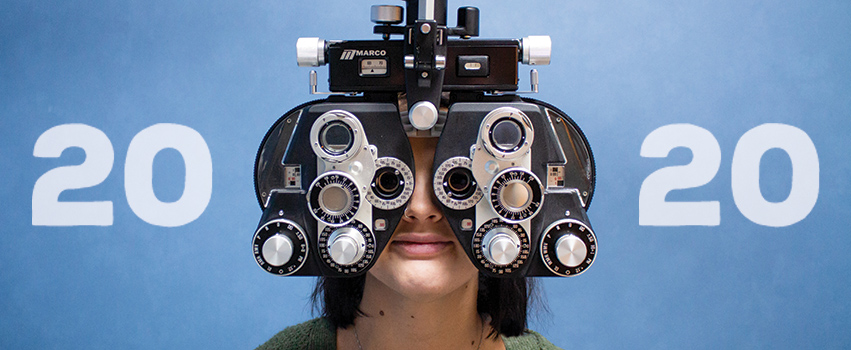
Happy 2020… the Year of Vision! If there was ever a year that had its own vision statement, this is it. “20/20” is synonymous with eyesight—and very good eyesight at that. Since 1862, the term has been used to represent “normal” eyesight. Think of it as the optometry equivalent to the letter grade “A.” And think of the year 2020 as the year we focus on our eyes.
Now that we’ve established 2020 as the year for vision, may I suggest a new year’s resolution? The first item to add to your to-do list: an eye exam. Some readers may not even remember the last time they had their eyes examined. Some might only be able to read this article thanks to the brand-new eyeglasses they’re wearing. Others may be smiling proudly because they’ve already been told they have 20/20 eyesight.
But many individuals with excellent eyesight are under the common misconception that having great eyesight means you no longer need eye exams. Unfortunately, an array of eye problems can sneak up on us without warning. In fact, many eye diseases don’t present themselves with symptoms of pain or blurred vision.
January happens to be Glaucoma Awareness Month. Glaucoma is known as “the silent thief of sight,” because it causes permanent damage to the eyes before any vision loss or symptoms are present. Because glaucoma often has no symptoms in its early stages, the National Eye Institute recommends regular eye exams to monitor eye health. Having 20/20 eyesight doesn’t make one immune to glaucoma, macular degeneration and diabetic retinopathy, among other eye health problems. In fact, having naturally terrific eyesight can be a problem itself because it brings a false sense of security.
Don’t be embarrassed if several years have gone by since your last eye exam, or if your most recent pair of eyeglasses are from the ‘90s. Just don’t let this year go by without bringing healthy eye care into clear focus! Every time you see or hear the word “2020,” use it as a reminder to think about your eyes.
Many people say that sight is the one sense they couldn’t live without. So, given this important role in our lives, make sure you take care of your eyes and put them at top priority along with your overall healthy living goals. Here are a few tips you can implement today:
- Wear sunglasses regularly. Sunglasses are more than just fashion statements. They protect your eyes in the same way sunscreen protects your skin from harmful UV rays.
- Eat healthy. A healthy diet provides nourishment to the retina and other structures in the eyes. The best foods for your eyes include fresh fish (salmon), leafy greens (spinach, kale), colorful fruits and vegetables, eggs, grains and nuts. In addition, ocular supplements provide the necessary nutrients of lutein and zeaxanthin.
- Reduce digital eyestrain. Too much staring at your screens can take a toll on the eyes and eye muscles. Taking regular breaks, reducing the brightness of screens, and avoiding screen time at night are all ways to help.
- Use contact lens safely. Don’t abuse contact lenses. Don’t sleep in contact lenses. Replace them as directed. Clean your contact lens case regularly. Always wash your hands before handling contact lenses.
- Schedule regular eye exams. The American Optometric Association recommends annual eye exams for students ages five to 17, exams at least every two years for adults 18 to 64, and annual exams for all contact lens wearers, diabetic patients, and anyone 65 and older.
So, as one final reminder, this is the year 2020—the year you shouldn’t take your eyes for granted. To ensure that your eyes continue to bring your world into focus, make sure you focus on them. Have a great new year! PM
Dr. Timothy Cundiff is an optometrist at Vision Care Center, with offices in Peoria and Washington, and serves as a trustee for the Illinois Optometric Association.
- Log in to post comments

